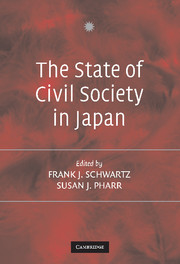Book contents
- Frontmatter
- Contents
- Tables and Figures
- Contributors
- Preface
- The State of Civil Society in Japan
- PART I CONTEXT
- PART II THE ASSOCIATIONAL SPHERE
- 4 From Developmentalism to Maturity: Japan's Civil Society Organizations in Comparative Perspective
- 5 Molding Japanese Civil Society: State-Structured Incentives and the Patterning of Civil Society
- 6 After Aum: Religion and Civil Society in Japan
- 7 State-Society Partnerships in the Japanese Welfare State
- PART III THE NONMARKET ACTIVITIES OF ECONOMIC ACTORS
- PART IV STATE-CIVIL SOCIETY LINKAGES
- PART V GLOBALIZATION AND VALUE CHANGE
- Bibliography
- Author Index
- Subject Index
6 - After Aum: Religion and Civil Society in Japan
Published online by Cambridge University Press: 05 July 2014
- Frontmatter
- Contents
- Tables and Figures
- Contributors
- Preface
- The State of Civil Society in Japan
- PART I CONTEXT
- PART II THE ASSOCIATIONAL SPHERE
- 4 From Developmentalism to Maturity: Japan's Civil Society Organizations in Comparative Perspective
- 5 Molding Japanese Civil Society: State-Structured Incentives and the Patterning of Civil Society
- 6 After Aum: Religion and Civil Society in Japan
- 7 State-Society Partnerships in the Japanese Welfare State
- PART III THE NONMARKET ACTIVITIES OF ECONOMIC ACTORS
- PART IV STATE-CIVIL SOCIETY LINKAGES
- PART V GLOBALIZATION AND VALUE CHANGE
- Bibliography
- Author Index
- Subject Index
Summary
Introduction
Religious organizations are powerful, vocal participants in America's civil society, and they enjoy a high level of public trust based on their many, widely known contributions. Among other things, they collect funds and perform volunteer services for the poor, the homeless, the unemployed, refugees, and victims of war and natural disaster; they manage hospitals, hospices, schools, and universities; they consult with policy makers at all levels of government; and they assist international bodies such as the United Nations in resolving ethnic and religious disputes. It is on the basis of this public trust and contributions to the public good that religious bodies enjoy tax Privileges. Japanese religious organizations also serve the public good in manifold ways. They operate schools, museums, parks, and hospitals; homes for orphans, the elderly, and the handicapped; rehabilitation facilities for the infirm and released prisoners; and a host of volunteer social Services (Bunkabu shūmuka 1997). The United Nations officially recognizes some Japanese religious organizations for their international development programs and peace work. But far from enjoying public trust, religion's position in Japanese society is vulnerable. Recent opinion polls show that only a minority of the population regards religious organizations as trustworthy, while a majority believe that there is no justification for continuing religions' tax Privileges (Ishii 2000).
This study identifies several factors accounting for Japanese religions' weak Status within civil society: politicization of public opinion regarding religion; the post-oil shock emergence of a new sector of the religious world, leading to a spectacular confrontation involving one religion of that sector, Aum Shinrikyō; and the resultant tightening of government regulation of all sectors of religion.
- Type
- Chapter
- Information
- The State of Civil Society in Japan , pp. 135 - 153Publisher: Cambridge University PressPrint publication year: 2003
- 10
- Cited by



